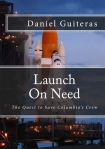Launch on Need, Daniel Guiteras [the giving tree read aloud TXT] 📗

- Author: Daniel Guiteras
Book online «Launch on Need, Daniel Guiteras [the giving tree read aloud TXT] 📗». Author Daniel Guiteras
“Alright, back to our graphic. Another important task accomplished during this rescue space walk, in addition to the transfer of astronauts, was the delivery of fresh lithium hydroxide canisters to Columbia. The canisters, about the size of a typical oatmeal container, scrub carbon dioxide from Columbia’s cabin air. By installing a new canister, NASA is able to buy time in the event of a contingency. If something unexpected happens to delay the rescue, something that requires NASA to keep astronauts on Columbia longer than expected, then Columbia will be able to safely continue serving as home. Things have been going so well for both crews that we’re all hoping the spare lithium hydroxide canisters won’t be needed for more than a few hours.
“One more thing I wanted to mention in this segment,” Stangley went on. “Earlier today, a few workers around the station here asked me about the bags they’ve seen Columbia’s crew wearing while transferring to Atlantis. Now I haven’t been able to confirm this with anyone at NASA yet, so I’m not one-hundred percent sure, but I’m reasonably certain those are their personal effects. Shuttle astronauts carry aboard what’s called an OFK, or official flight kit, and a PPK, or personal preference kit. The OPK is a container, about two cubic feet in size, and it is used by astronauts to carry official NASA mementos into space—things such as pins, patches, medallions, et cetera. There are no personal items carried in the OFK. In the PPK, a nylon container measuring five by eight by two inches, astronauts carry up to twenty personal mementos with a total weight not to exceed one-and-a-half pounds. Items in the PPK often include jewelry, photos and other doodads. So I’m guessing that these bags we’ve seen tethered to the space suits of the Columbia astronauts contain the astronauts’ OFKs and PPKs. Ah, okay,” Stangley said, picking up radio communications through his earpiece between Mission Control and the astronauts. “Let’s rejoin NASA.”
“Atlantis, Houston, for the EVA crew.”
Mullen gave Garrett a thumbs-up and Garrett responded with the same.
“Houston, this is Garrett. Mullen and I are ready, over.”
“Okay, you guys are almost done. The EMUs are ready in Atlantis’s airlock. All you need to do now is take them to Columbia so the commander and pilot can suit up.”
“Roger that Houston, two to go!”
“Oh, and as a reminder once again, tether in ASAP.”
“Roger, Houston, we’re almost back to the slide wire. We’ll tether in upon arrival.”
Garrett and Mullen maneuvered themselves down into Atlantis’s payload bay and as soon as they reached the slide wire they connected their retractable tethers.
Garrett arrived at the airlock first and peered down through the 4-inch-diameter airlock window. The two empty EMU suits were floating in the airlock, not limp and lifeless, but inflated—two arms, two legs, a helmet, and a trunk with life-sized girth. The suits were empty, but took on human shape after being powered up and pressurized. This prevented water in the suits from freezing during the trip between ships.
Mullen took a drink from his water pouch, then called Mission Control.
“Houston,” he paused, swallowing another sip of water. “Mullen here. Garrett and I are in position outside the airlock waiting for airlock depress.”
“Roger that, stand by for airlock depress.”
Chapter 67
On Columbia
WITH THE GENTLE PUSH of one foot, Columbia’s commander sailed expertly up from the mid-deck, through the interdeck passageway, to the overhead windows of the flight deck. He stopped there to gaze down at the spectacle outside.
A dark sky so black it didn’t seem real filled the perimeter of the window frame. In center frame, Atlantis, with wings and payload bay doors splayed, glistened in a bath of sunlight. Directly below Atlantis was Earth, rendered in a colorful clarity he’d not seen before. He thought to raise a hand to shield his eyes from the light, but the image held him still. Atlantis, the blessed rescue ship, beckoned. She was ready to take him.
On a rope between the two orbiters, Columbia’s fifth crew member was on his way to Atlantis, assisted by Garrett and Mullen. The commander smiled; the rescue of his crew was going well.
“Columbia, Houston—for the commander.”
“Houston, Columbia,” the commander responded, reluctant to be pulled from a rare personal moment. He pushed away from the windows and maneuvered down to his seat on the flight deck. He knew why they were calling. Columbia could not be salvaged. She’d flown her last mission. And now the commander had the unenviable task of setting her switches so that Mission Control could command Columbia from the ground. Then later, once Atlantis was home safely, Mission Control would command a deorbit burn of Columbia and she would start her fall, quickly to become consumed by the friction of reentry, her remains falling as broiling metallic rain into the South Pacific Ocean.
He fastened his seatbelt so his hands would be free to work. “I’m ready for you,” Columbia’s commander told Mission Control.
“Okay, we have a number of switch configurations we need you to set for us.”
“Roger, Houston. Call ’em out.”
It was impossible for an orbiter to reenter Earth’s atmosphere and land without a crew aboard. Mission Control could command some of the systems from the ground, but not all. It could not start up the auxiliary power units, for example; thus the hydraulic pumps would be inoperable and therefore the hydraulically controlled flight surfaces such as rudder, elevons and speed brakes would be inoperable. Neither could Mission Control





Comments (0)